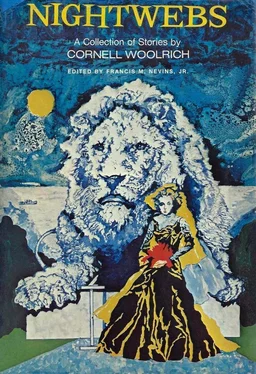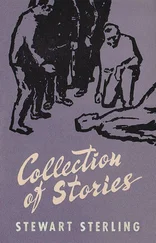Then they turned it over to Missing Persons, had her description broadcast, and told him there wasn’t anything he could do for the present but go home.
He didn’t even try to sleep when he got back the second time. Just sat there waiting — for the call that didn’t come and that he somehow knew wouldn’t come, not if he waited for a week or a month.
It was starting to get light by that time. The third day since she’d been swallowed up bodily was dawning. She wasn’t in the city, alive or dead, he was convinced. Why sit there waiting for them to locate her when he was sure she wasn’t here? He’d done all he could at this end. He hadn’t done anything yet at the other end. The thing was too serious now; it wasn’t enough just to take the word of a voice over a telephone wire that she wasn’t up there. Not even if the voice was that of her own mother, who was to be trusted if anyone was, who thought as much of her as he did. He decided he’d go up there himself. Anything was better than just sitting here waiting helplessly.
He couldn’t take the early-morning bus, the way he wanted to. Those building plans he was finishing up had to be turned in today; there was an important contractor waiting for them. He stood there poring over the blueprints, more dead than alive between worry and lack of sleep, and when they were finally finished, turned in, and O.K.’d, he went straight from the office to the terminal and took the bus that should get in there about dark.
Denby wasn’t even an incorporated village, he found when the bus finally got there, an hour late. It was just a place where a turnpike crossed another road, with houses spaced at lengthy intervals along the four arms of the intersection. Some of them a quarter of a mile apart, few of them in full view of one another due to intervening trees, bends in the roads, rises and dips of the ground. A filling-station was the nearest thing to the crossroads, in one direction. Up in the other was a store, with living-quarters over it. It was the most dispersed community he had ever seen.
He chose the store at random, stopped in there, and asked, “Which way to the Alden house?”
The storekeeper seemed to be one of those people who wear glasses for the express purpose of staring over instead of through them. Or maybe they’d slipped down on the bridge of his nose. “Take that other fork, to your right,” he instructed. “Just keep going till you think there ain’t going to be no more houses, and you’re sure I steered you wrong. Keep on going anyway. When you least expect it, one last house’ll show up, round the turn. That’s them. Can’t miss it. You’ll know it by the low brick barrier wall runs along in front of it. He put that up lately, just to keep in practice, I reckon.”
Bliss wondered what he meant by that, if anything, but didn’t bother asking. The storekeeper was evidently one of these loquacious souls who would have rambled on forever given the slightest encouragement, and Bliss was tired and anxious to reach his destination. He thanked him and left.
The walk out was no picayune city block or two; it was a good stiff hike. The road stretched before him like a white tape under the velvety night sky, dark-blue rather than black, and stars twinkled down through the openings between the roadside-tree branches. He could hear countryside night noises around him, crickets or something, and once a dog barked way off in the distance — it sounded like miles away. It was lonely, but not particularly frightening. Nature rarely is; it is man that is menacing.
Just the same, if she had come up here — and of course she hadn’t — it wouldn’t have been particularly prudent for a young girl alone like her to walk this distance at that hour of the night. She probably would have phoned out to them to come in and meet her at the crossroads, from either the store or that filling-station. And yet if both had been closed up by then — her bus wouldn’t have passed through here until one or two in the morning — she would have had to walk it alone. But she hadn’t come up so why conjure up additional dangers?
Thinking which, he came around the slow turn in the road and a low, elbow-height boundary wall sprang up beside him and ran down the road past a pleasant, white-painted two-story house, with dark gables, presumably green. They seemed to keep it in good condition. As for the wall itself, he got what the storekeeper’s remark had intended to convey when he saw it. It looked very much as though Alden had put it up simply to kill time, give himself something to do, add a fancy touch to his property. For it seemed to serve no useful purpose. It was not nearly high enough to shut off the view, so it had not been built for privacy. It only ran along the front of the parcel, did not extend around the sides or to the back, so it was not even effective as a barrier against poultry or cattle, or useful as a boundary mark. It seemed to be purely decorative. As such, it was a neat, workmanlike job; you could tell Alden had been a mason before his marriage. It was brick, smoothly, painstakingly plastered over.
There was no gate in it, just a gap, with an ornamental willow wicket arched high over it. He turned in through there. They were up yet, though perhaps already on the point of retiring. One of the upper-floor windows held a light, but with a blind discreetly drawn down over it.
He rang the bell, then stepped back from the door and looked up, expecting to be interrogated first from the window, particularly at this hour. Nothing of the kind happened; they evidently possessed the trustfulness that goes with a clear conscious. He could hear steps start down the inside stairs. A woman’s steps, at that, and a voice that carried out to where he was with surprising clarity said, “Must be somebody lost their way, I guess.”
A hospitable little lantern up over the door went on from the inside, and a moment later he was looking at a pleasant-faced, middle-aged woman with soft gray eyes. Her face was long and thin, but without the hatchet-sharp features that are so often an accompaniment of that contour of face. Her hair was a graying blond, but soft and wavy, not scraggly. Knowing who she was, he almost thought he could detect a little bit of Smiles in her face: the shape of the brows and the curve of the mouth, but that might have been just autosuggestion.
“Hm-m-m?” she said serenely.
“I’m Ed, Mrs. Alden.”
She blinked twice, as though she didn’t get it for a minute. Or maybe wasn’t expecting it.
“Smiles’ husband,” he said, a trifle irritatedly. You’re supposed to know your own in-laws. It wasn’t their fault, of course, that they didn’t. It wasn’t his, either. He and Smiles had been meaning to come up here on a visit as soon as they could, but they’d been so busy getting their own home together, and six weeks is such a short time. Her mother had been getting over a prolonged illness at the time of their wedding, hadn’t been strong enough for the trip down and back.
Both her hands came out toward his now, after that momentary blankness. “Oh, come in, Ed,” she said heartily. “I’ve been looking forward to meeting you, but I wish it had been under other circumstances.” She glanced past his shoulder. “She’s not with you, I see. No word yet, Ed?” she went on worriedly.
He looked down and shook his head glumly.
She held her hand to her mouth in involuntary dismay, then quickly recovered her self-control, as though not wishing to add to his distress. “Don’t know what to think,” she murmured half audibly. “It’s not like her to do a thing like that. Have you been to the police yet, Ed?”
“I reported it to them before daylight this morning. Had to go around to the different hospitals and places.” He blew out his breath at the recollection. “Huff, it was ghastly.”
Читать дальше












